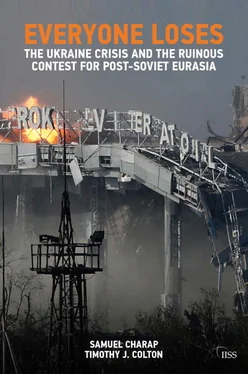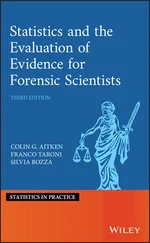Prevailing interpretations of the conflict – either Saakashvili fell into an elaborate Russian trap or he launched a murderous Reconquista war with a tacit green light from Washington – are equally fallacious. Both assume premeditation and planning that the facts do not corroborate. It does look as if the Georgian government had been gearing up for a war, but earlier in the summer, and in Abkhazia, not South Ossetia. [44] ‘Ex-Ambassador of Georgia: Georgian Invasion to Abkhazia Was Prepared in April–May’, Caucasian Knot , 25 November 2008, http://www.eng.kavkaz-uzel.eu/articles/8765/ ; International Crisis Group, ‘Georgia and Russia: Clashing over Abkhazia’, Europe Report no. 193, 5 June 2008.
In the hours leading up to the decision to attack, the Georgian leadership seemed to have come to believe that a Russian invasion was in motion. [45] According to Asmus, Saakashvili received reports on 7 August that Russia was massing troops on the border and even inside South Ossetia. Asmus, A Little War That Shook the World , p. 23. See also C.J. Chivers, ‘Georgia Offers Fresh Evidence on War’s Start’, New York Times , 15 September 2008.
Russia may well have been trying to provoke Saakashvili, and it was certainly employing heavy-handed deterrence, particularly with its large military exercise that ended in early August. [46] As Asmus writes, ‘Throughout this period, Russian officials used both front and back diplomatic channels to tell their Western counterparts that their military steps were simply a deterrent to prevent the Georgians from acting rashly and attacking Abkhazia.’ Asmus, A Little War That Shook the World , p. 145.
But on 7 August, Russia had only minimal forces present near the Roki Tunnel leading from Russia to South Ossetia. Medvedev was on a cruise on the Volga; Putin, now prime minister, was at the Beijing Olympic Games; and the defence minister was on vacation on the Black Sea coast. In short, both sides were preparing for a war, but neither was planning for the war that actually happened.
The war itself should thus be seen as a classic security dilemma, in which escalation spirals spark conflict despite a lack of aggressive intent. That said, tensions between Russia and Georgia had grown that spring and summer in part because of the zero-sum approach of some Western countries, particularly the US under the Bush administration. With the exception of Germany’s foreign minister, Frank-Walter Steinmeier, no visible effort was made at preventative diplomacy involving Moscow. Indeed, the Bucharest misadventure did not cause Washington to give up the push for MAP; after the summit, and even after the war, it still pressed its reluctant allies on this point. [47] For example, Cheney called for granting a MAP in a speech in Italy in September 2008: ‘At Bucharest only five months ago, we considered extending a Membership Action Plan to Georgia and Ukraine, but did not do so. But Allies agreed that those nations will be NATO members, and the time to begin their Membership Action Plans, I believe, has come.’ ‘Vice President’s Remarks at the Ambrosetti Forum’, 6 September 2008, http://georgewbush-whitehouse.archives.gov/news/releases/2008/09/20080906-1.html .
The Bush administration concluded that ‘Russia interpreted the denial of MAP as a green light for action against Georgia’. [48] ‘Ukraine, MAP, and the Georgia–Russia Conflict’, 14 August 2008, released by WikiLeaks as Cable 08USNATO290_a, https://wikileaks.org/plusd/cables/08USNATO290_a.html .
On that twisted logic, granting MAP would have been a deterrent to future bellicosity. With much of Georgia still smouldering, the idea that now was the time for NATO to antagonise Russia once again found few adherents in Brussels.
Moscow, for its part, could not resist coercing Tbilisi in the run-up to the August war. While it doubtless had to respond to the attack on Tskhinvali, in the event its response was disproportionate and punitive. Not only did the Russian military devastate the Georgian armed forces’ capabilities, but it and its South Ossetian confederates expelled more than 25,000 ethnic Georgians from South Ossetia. It might have gained primacy over 20% of Georgia’s territory, but it lost the hearts and minds of the rest of the country. By recognising Abkhazia and South Ossetia, Moscow may have avenged the West’s move in Kosovo, but it created a range of problems for itself. Russia seemed to have taken the opportunity to implement several objectives once the shooting began, particularly ruling out MAP and NATO membership. In this sense, Georgia suffered more from the Russia–West tug of war than it would have under other circumstances. As Dmitri Trenin of the Carnegie Moscow Center writes, ‘For Moscow, the war was not about Georgia as much as about the United States, with Georgia no more than a proxy.’ [49] Dmitri Trenin, Post-Imperium: A Eurasian Story (Washington DC: Carnegie Endowment for International Peace, 2011), p. 98.
In the wake of the Georgia war, the West came to view Russia in far more adversarial terms. The US response included cutting off all contact between Pentagon officials and the Russian military; pushing for the suspension of the NATO–Russia relationship; and pulling a civil nuclear agreement from Congress. We now know that a far more drastic response was considered at the highest levels of the Bush administration during the war itself. The president, vice president and other senior officials held a meeting to consider the possibility of using military force to prevent Russia from continuing its military assault on Georgia. Bombardment of the Roki Tunnel that Russian troops used to move into South Ossetia and other ‘surgical strikes’ were among the options discussed. Upon consideration, the group ruled out any military response. [50] Asmus, A Little War That Shook the World , p. 186.
In an interview 18 months later, a Cheney aide said he remained unsure ‘whether or not [use of force] should have been more seriously considered’. He went on: ‘If Russia continues to assert itself either militarily or through other coercive means to claim a sphere of influence, we will look back at this as a time that they were able to change boundaries in Europe without much reaction. And then we’ll say we should have considered harder options.’ [51] Joe Wood interview in Ben Smith, ‘U.S. Pondered Military Use in Georgia’, Politico , 3 February 2010, http://www.politico.com/story/2010/02/us-pondered-military-use-in-georgia-032487 .
The US, it was implied, should have gone to war with Russia to rebuff its assertive actions in the region. Without question, the messy equilibrium regarding the regional order that had emerged following the Soviet collapse had been upset.
Enter the EU and the EEU
The European Union, with its institutional hub in Brussels now taking precedence over member-state governments, began to play a more active role in post-Soviet Eurasia after the Georgia war. The French president, Nicolas Sarkozy, then holder of the rotating EU presidency, was the chief negotiator of the ceasefire agreement that helped end the conflict. The EU fielded a monitoring mission in Georgia to keep the peace, which has remained in place ever since. Along with the UN and the OSCE, the EU was appointed a co-chair of the Geneva International Discussions, the negotiating format for Georgia’s conflicts.
But the instruments for an enlarged EU role were more geo-ideational and geo-economic than geopolitical. The EU first formalised a policy toward the region in 2004. The European Neighbourhood Policy (ENP) provided a framework for the Union’s efforts in its southern and eastern adjacencies with the objective of establishing a stable, prosperous, secure and democratic ‘ring of friends’. It set about realising this objective through policy instruments that were ‘rule-oriented, non-militarized, and technocratic’, claiming the mantle of a ‘normative power’, not a great power. [52] Dragneva and Wolczuk, Ukraine Between the EU and Russia , p. 4. The term ‘normative power’ was first used in Ian Manners, ‘Normative Power Europe: A Contradiction in Terms?’, Journal of Common Market Studies , vol. 40, no. 2, June 2002, pp. 235–58.
The ENP strategy paper proposed a straightforward trade to the EU’s neighbours: ‘In return for concrete progress demonstrating shared values and effective implementation of political, economic, and institutional reforms, including in aligning legislation with the acquis , the EU’s neighbourhood should benefit from the prospect of closer economic integration with the EU.’ [53] ‘Communication from the Commission to the Council and the European Parliament: Wider Europe – Neighbourhood: A New Framework for Relations with Our Eastern and Southern Neighbors {COM(2003) – 104 Final}’, 11 March 2003, http://eeas.europa.eu/enp/pdf/pdf/com03_104_en.pdf .
This outwardly innocuous approach belied both the emerging zero-sum intentions of some member states and the zero-sum impact of the EU’s normative instruments – an exercise par excellence in geo-ideational politics with geo-economic consequences.
Читать дальше











